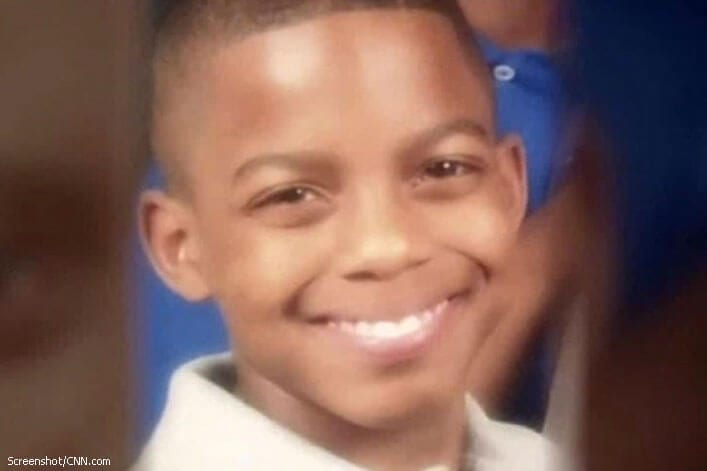It seems like just about a year ago around this time, there were stories flooding the media about police brutality against unarmed African Americans. Every other week, a new tragedy was surfacing and sparking outrage in the battle between which lives matter, Black or Blue.
But somehow, there’s recently been an unsettling case that’s gotten buried under the Facebook frenzy obsessed with Trump’s latest tweet and Kim Kardashian’s latest Ellen interview.
It is the story of Jordan Edwards.

Last Saturday evening, the 15-year-old from Balch Springs, Texas, was leaving a party when he was shot and killed by officer Roy Oliver.
Police initially reported that Jordan’s car was reversing “aggressively” toward them, igniting the officer to shoot a bullet straight through Jordan’s head. The unarmed teen was pronounced dead in the hospital shortly after the incident.
Upon further investigation of the video evidence, the police chief released a statement admitting that the “exact opposite” occurred. The car was actually driving AWAY from police, not reversing into them as previously stated.
After close review, the chief admitted that Oliver’s actions “did not meet [their] core values” and that he “violated several departmental policies.” Officer Oliver has since been fired for his murderous act of misconduct, but there is still one less innocent child in this world, and one massive support system grieving his tragic loss.
Unlike many police brutality cases of this sort, the evidence on this one was NOT fuzzy. Officer Oliver shot an innocent young man—one with a bright future.
Friends, family and teachers alike were outraged at the cruel and irreversible punishment inflicted upon this teen who was not a suspect, had no gun and did not resist arrest.
So how in the WORLD did he end up dead?
Along with the pain and fury associated with Jordan’s murder have surfaced glowing comments of his outstanding character as a “good student” and standout athlete.
In fact, it’s been the center of attention surrounding his death.
Jordan was known as a star pupil who also played receiver and quarterback for his high school football team.
“He had such an impact on all of us and we refuse to let anyone tarnish that,” remarked head coach Jeff Fleener, later adding that Jordan was a “coach’s dream” and “exactly the type of kid that you want in a program.”
“Jordan was a straight-A student and a standout athlete who was beloved by his schoolmates,” reported the Edwards’ family attorney.
The Mesquite Independent School District followed with remarks that he “was a good student who was very well-liked by his teachers, coaches and his fellow students.”
“He was not a thug. This shouldn’t happen to him,” added one of the parents of Jordan’s football teammates.
While all of these remarks about Jordan’s achievements and abilities are certainly admirable, they are NOT the reason this teen didn’t deserve to die, as CNN boldly pointed out:
If you think Jordan didn’t deserve to die because he was a good student, then you’re missing the point. Jordan’s achievements don’t make him any more valuable than a person who had trouble in school and a history of bad decisions.
What makes a person’s life precious is simply the fact that he or she is a living, breathing human being. As wonderful a teenager as Jordan was, his death would be no less tragic if his record had been less admirable.
Many times, the public will look at someone’s record of rights and wrongs to determine whether that person “deserved” to die. Resist that impulse.
As humans, we are all too quick to judge someone’s worth by their merit and worldly labels. The death of a “good student” or “coach’s dream” somehow seems more crushing than the death of a “high-school dropout” or a “street thug” with a less-than-stellar track record.
As stated by CNN reporter Jemar Tisby on the matter, “We want to create a monster who doesn’t merit mercy or a moral exemplar whose life is more valuable than the average person’s. Neither villainizing nor valorizing does justice to the fundamental dignity everyone deserves.”
While a person’s actions and character certainly do matter, have profound impact and are worthy of being remembered in the wake of a lost loved one, they are not what dictate a person’s worth.
What matters is not that Jordan was a “good student,” but that he was a child of God. Period.
The Bible clearly states that we are all fearfully and wonderfully made in His image, regardless of race, social stature or wealth—and my prayer is that Jordan’s tragic death opens our eyes to other senseless murders of this kind slipping through our justice system.
“Jordan’s death should cause us to re-evaluate how law enforcement officers are being trained,” added Tisby. “It should elicit calls for information and accountability if criminal wrongdoing is discovered.”
Beyond this larger picture, I pray Jordan’s family may find peace and healing amidst this unthinkable time of grieving. They described him as a “loving child,” and a “brother’s best friend” who exuded a “humble and sharing spirit.”
May their heart-wrenching loss be a light to our law enforcement system that this injustice must be eradicated at the root level so that no other family has to endure such unspeakable pain.

